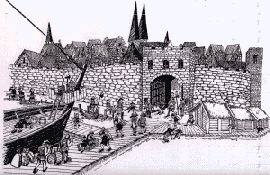Meet the Middle Ages
BackTrade

By the end of the 13th century, buying and selling goods was forbidden in the country-side. All trade had to take place in town. By means of duties and taxes, the King gained profits from the trade, and the merchants of the towns could make their living. The merchants bought goods from the peasants around town, as well as large parts of the craftsmen’s products and sold it on to foreign countries. In this way, it was possible to import things not available in the country, like wine, fine cloth, salt and spices. The merchants in the Nordic countries had valuable contacts with other countries and towns, particularly with Germany.
German merchants were influential in the founding of many towns during the 13th century, for example Riga and Königsberg. In many towns most trade was controlled by Germans. They made agreements with some towns, among them Stockholm and Kalmar, about how trade should be conducted. These agreements gave the Germans lower duties and higher profits. The Nordic merchants sometimes had advantages in German towns. Kalmar citizens and people from Öland, for example, had a trading agreement with Greifswald during the 13th century.